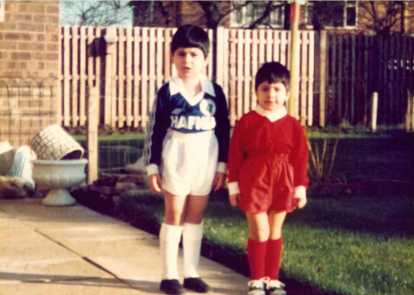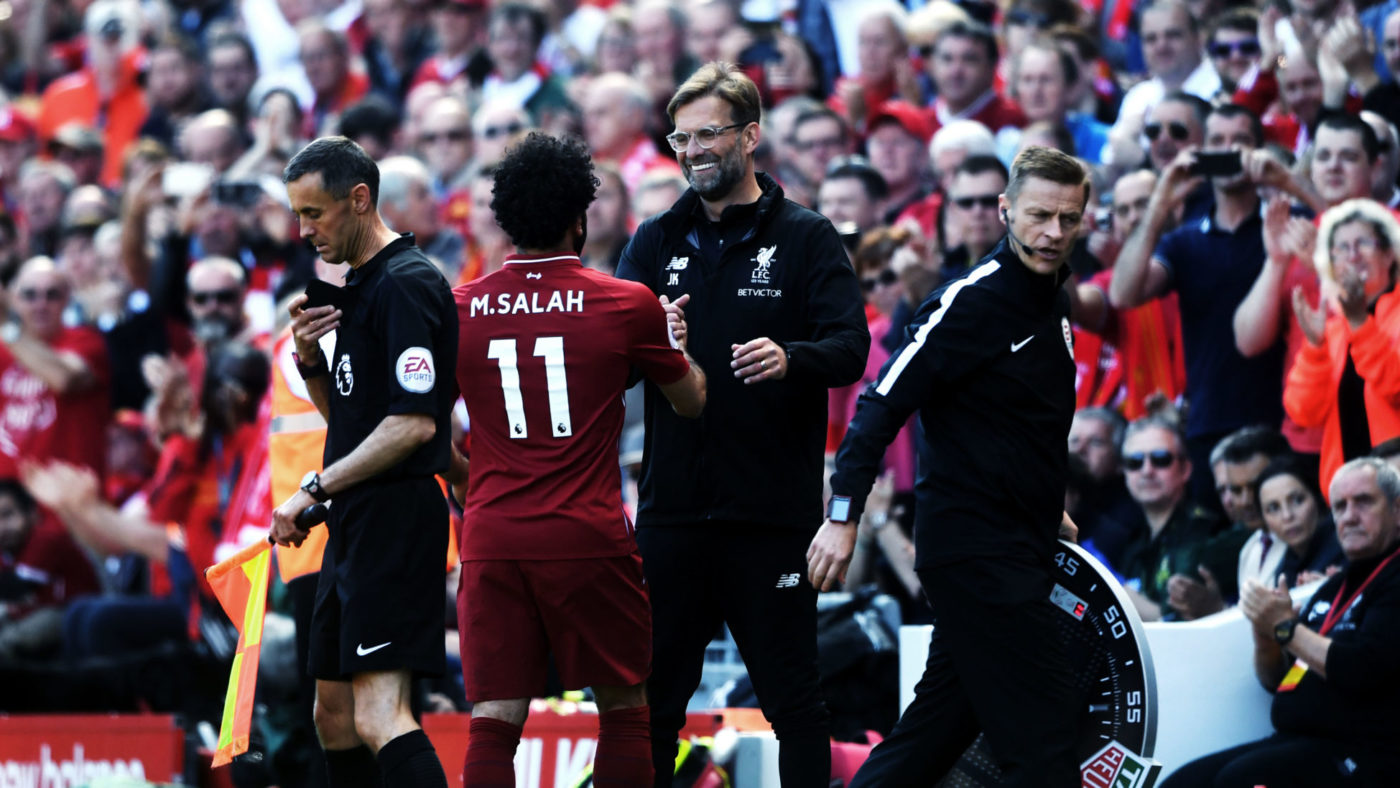I was just seven when Liverpool last played Real Madrid in the European Cup Final. I remember it well because, as a young Evertonian, I supported Real Madrid.
Being an Evertonian is a lifelong allegiance that I acquired by chance. I did not inherit a football team from my cricket-mad Indian Dad. Growing up in the Wirral, in Ellesmere Port, Cheshire, a mixed race kid in possession of a scouse accent, I think my Mum thought it might be a good idea if we knew something about football too. She says I could say ‘Kevin Keegan’ by the age of three, not enormously behind Mum and Dad among my first words.
When I was five, she bought two football mugs, one with the Everton club badge and the other with the Liverpool crest. I chose the Everton one, and my younger brother would get the Liverpool one. I was a blue. He was a red.
I really got the football bug. There I am on a bright Christmas morning in 1980 decked out in the full Everton replica kit, with shorts and socks, alongside my three year old brother kitted out in Liverpool red.

I have indelible memories of several of the big football matches of 1981, the first season that I can recall. I still remember how devastated I was to hear that Manchester City had knocked Everton out of the FA Cup in the quarter-finals. The local newsagent kept by copies of Shoot! Magazine and of Roy of the Rovers every week.
Because Roy Race usually came out on top, I am just not sure that I had realised before that, in real life football, the other team could beat Everton and win too. So I have never really forgiven Manchester City for that. I was a massive fan of the Spurs team of Glenn Hoddle, Ossie Ardiles and Ricky Villa who beat them in the Cup final.
I guess it was my best friend Andrew, whose older brother was a Liverpool fan but his Dad was an Evertonian too, who told me that Everton fans should support Liverpool’s Spanish opponents. I was allowed to stay up late again, though this one seemed a long and boring match, before Alan Kennedy scored a winning goal.
That gave half of our class something to celebrate the following day.
Yet this was the friendliest of rivalries, especially when both Merseyside clubs were at the top of the game. ‘Are you watching Manchester’ sang both sets of fans at the Milk Cup final in 1984. I got to go to the replay at Maine Road, my first ever match, three days before my tenth birthday. Liverpool won one-nil. We travelled to London for the 1984 Charity Shield with, like many cars, a blue and white scarf flying out of the window on one side, and a red and white one from the others. A Bruce Grobbelaar own goal meant Everton won that one.
However friendly the rivalry, now that I had my tribe, I took being part of it seriously. So I refused on principle to ever wear anything red until I was fifteen.
Then, suddenly, I lost my tribalism about the reds. It had seemed a very ordinary Saturday for my football-mad fifteen year old self. I went to play football in the park at lunchtime before going home to listen to the football on the radio.
My focus was on Everton playing in the FA Cup semi-final against Norwich at Villa Park, while Liverpool would play Nottingham Forest at Hillsborough.
That day when 96 people died changed everything.
There was little point in trying to remain cold to You’ll Never Walk Alone.
When Liverpool took the field three weeks later to replay the abandoned semi-final, I found that, for the first time in my life, I was watching a football match that I wanted Liverpool to win, so that they could play Everton in the final.
I was at Wembley for the Cup final, five weeks after the disaster, supporting Everton of course, but I could not really mind that Liverpool won the cup. But I was rooting for Arsenal at Anfield in the final game so that the reds did not do the Double. So I did not make supporting Liverpool a habit. I was very happy when Milan went three-nil up in the European Cup final, but after their comeback, could not really begrudge Liverpool winning the penalty shoot-out.
But what about this Saturday in Kiev? I would find it a bit harder to support Real Madrid than when I was seven. Though when I asked a tribally left-wing Evertonian for his view this week, he had decided to support Real. “I would rather be a Francoist than a Koppite”, he reasoned.
But I think I will cheer for the Reds this time. I fear that I may have developed a secret Evertonian crush on Jurgen Klopp.
His team have played brilliantly attacking football, and while you are never sure if they will hold on to a two or even three-goal lead, Mo Salah’s miraculous goalscoring exploits might even lead to the mass conversion of many Scouse Catholics to Islam.
What Jurgen Klopp really understands is identity: especially what he inherits, and is the guardian of, in the Liverpool tradition.
“If you google ‘European nights’, the answer must be Anfield,” he said this week.
Klopp is an exemplar of a common phenomenon: that of the migrant-patriot. Klopp is the heir to Bill Shankly, Bob Paisley and Kenny Dalglish, who each came to Liverpool from Ayrshire, County Durham and Glasgow to write chapters of a local legend on Merseyside. It was characteristic too for Arsene Wenger, the French Anglophile leaving Arsenal after a quarter of a century, to name-check Herbert Chapman in his final interview, having written a new chapter in the Arsenal canon.
It is no coincidence that it was newly-industrialised cities like Liverpool, Manchester and Turin that produced the great European football clubs, as newcomers cast around for something to belong to. “Here there were identity gaps to fill” write Simon Kuper and Stefan Syzmanski, so the sporting clubs that were a focal point for new civic identities mattered much more than in national capitals or ancient cathedral towns.
Integration depends on knowing the answer to he question ‘integration into what?’ Klopp answers that powerfully in his narration of a recent ‘We are Liverpool’ video.
This story of Jurgen Klopp at Liverpool offers important lessons that could translate from club to country.
A strong identity helps. We need to know who ‘we’ are, if we want incomers to join our club. With a confident sense of ourselves, others adopting that shared identity becomes a vote of confidence in that tradition, not a dilution or a threat. Sporting tribes are meaningful communities of shared allegiance, of shared experiences, memories and stories. They are also tribes which are open to joiners.
That’s why even an Evertonian can salute Jurgen Klopp as the king of the Kop – a lesson in how civic patriotism works.


